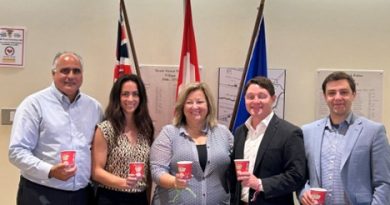Roadmap to Wellness Addresses Ontario’s Mental Health Needs
By Goldie Ghamari, MPP for Carleton
The next two weekends will be filled with excitement in the Carleton riding as two of our biggest winter carnivals take place.
The Greely Winter Carnival takes place this weekend, and this one is special as it is the 50th anniversary of the event! The carnival features a board game café night at the Greely Community Centre Thurs., Jan. 26, a Kids GLOW Dance Fri., Jan. 27, and a full weekend of events at the Community Centre.
The following weekend, Shiverfest returns to Manotick for the first time since 2020. Things get underway Friday, Feb. 3 with the Rideau Skating Club exhibition, an outdoor bonfire, family skating, Timbits hockey and a magic show. Sat., Feb. 4 beings with the Kiwanis Pancake Breakfast and has a full slate of events running all day throughout the village.
Details for both carnivals are inside this issue of the Messenger.
And to think just two weeks ago we had no snow and wondered if we would be able to have sleigh rides at our winter carnivals!
Ontario’s Roadmap to Wellness
On Jan. 25, Bell Let’s Talk Day gives us all the chance to open up and talk about mental health.
Every year, more than one million Ontarians experience a mental health or addiction. This can have a serious impact on their quality of life and that of everyone around them. It can reduce their ability to go to school, make a living or raise a family. With 500,000 Canadians per week calling in sick because of mental health and addictions issues, there are clear consequences for the province’s economic productivity. By way of reference, the economic burden of mental health issues in Canada can be upwards of $50 billion per year.
Over the course of a year of extensive consultations in communities across Ontario, the province heard that there are several key challenges facing mental health and addictions services.
With the launch and implementation of Roadmap to Wellness, Ontario will develop a mental health and addictions system that makes high-quality services available for people throughout their lifetime, where and when they need them.
As the name implies, Roadmap to Wellness is a guide to building a comprehensive and connected mental health and addictions system that is sensitive to the needs of Ontario’s diverse population. It will be a system that people find easier to navigate and where they can access the right level of care to meet their needs. Ontarians will no longer feel lost or unsupported.
To enable this plan, Ontario is investing $3.8 billion to expand existing programs and fill gaps in care with innovative solutions and services. This includes a $1.9-billion investment from the province, as well as a $1.9-billion investment from the shared priorities funding agreement with the federal government.
Roadmap to Wellness will benefit all Ontarians, including children and youth, Indigenous people, Francophones, first responders, students, individuals who are justice-involved and people experiencing homelessness. It will enable a system that can more effectively respond to everyone’s needs, whether they have a mild to moderate mental health issue or are challenged by a serious and significant illness.
Implementing this roadmap will require a whole-of-government approach, with investments in services provided by partner ministries, such as Children, Community and Social Services, Municipal Affairs and Housing, Solicitor General, Education and Indigenous Affairs, among others. It will also require consistent and ongoing communication between the many mental health and addictions partners and the children, youth, adults and seniors they serve to ensure their needs are being met, today and well into the future.
Building a comprehensive and connected mental health and addictions system will take time, but it is the right thing to do. Everyone in Ontario deserves the highest standard of mental health and addictions care in Ontario. There is no health without mental health.
Listening to clients, caregivers and experts
Roadmap to Wellness is a plan built from the ground up. Over the last year, the government has had conversations with hundreds of Ontarians in communities such as Barrie, Ottawa, London, North Bay, Kitchener-Waterloo, Niagara, Windsor, Brockville, Thunder Bay, Toronto and the Greater Toronto Area. Further conversations were held in Guelph, Sarnia, Goderich, Sandy Lake and Sioux Lookout. The discussions included grassroots community organizations, health care providers on the frontline, health system leaders, experts and advocates, as well as people with lived experience of mental health and addiction issues, their families and caregivers. People with experience and expertise in Indigenous mental health and addictions, municipalities, associations and justice system representatives also provided input. Engagement with Indigenous communities and other priority groups will continue.
The discussions revealed that Ontarians are supportive of the foundational work needed to support an efficient and effective mental health and addictions system, but are also serious about the urgent need to invest in services and supports across the province. There was broad consensus on three key findings:
Upstream investments in areas such as early intervention, traditionally delivered by community organizations, have one of the highest rates of return of any mental health spending and should be a significant area of focus.
It is difficult to achieve the integration of primary and acute care, and improve client pathways, if the community sector lags in clinical and data capacity.
Investing in community-based services is the best way to achieve success in ending hallway health care, as these investments help divert people from the hospital.
The clear takeaway from the consultations was the need to invest in community-based mental health and addictions services. Most participants also agreed that the system is too fragmented and would benefit from greater integration to improve access and ensure greater alignment with primary and acute care delivery partners. The province is committed to continuous and ongoing engagement with sector partners, clinical researchers, caregivers and people with lived experience.
A plan to build Ontario’s mental health and addictions system
The new Mental Health and Addictions Centre of Excellence within Ontario Health will serve as the foundation on which Roadmap to Wellness is built and will enable and drive the effective implementation of the plan’s four pillars – areas of focus that, executed together, will support the delivery of the services people need, where and when they need them. These pillars are:
- improving quality;
- expanding existing services;
- implementing innovative solutions; and
- improving access.
Establishing the Mental Health and Addictions Centre of Excellence
The new Mental Health and Addictions Centre of Excellence within Ontario Health will serve as the foundation on which Roadmap to Wellness is built and will be responsible for system management, coordination of services and driving meaningful quality improvements for more consistent patient experiences across the province. To do so, this new Mental Health and Addictions Centre of Excellence will:
- establish a central point of accountability and oversight for mental health and addictions care;
- be responsible for standardizing and monitoring the quality and delivery of evidence-based services and clinical care across the province to provide a better and more consistent patient experience;
- create common performance indicators and shared infrastructure to disseminate evidence and set service expectations; and
- provide support and resources to Ontario Health Teams as they use the core services framework to connect patients to the different types of mental health and addictions care they need and help them navigate the complex system.
This approach is designed to ensure equity in the quality and delivery of mental health and addictions services across Ontario, while also supporting evidence-based decisions and improved accountability to ensure a better and more consistent client experience.
Office Notice:
My office is open Monday to Friday, 9 am to 4 pm. If you require assistance on any matter, please contact me at any time. My staff and I will be happy to assist. Even if it’s not a provincial issue, I’ll make sure to connect you with the proper office.
– Goldie
Your voice at Queen’s Park






